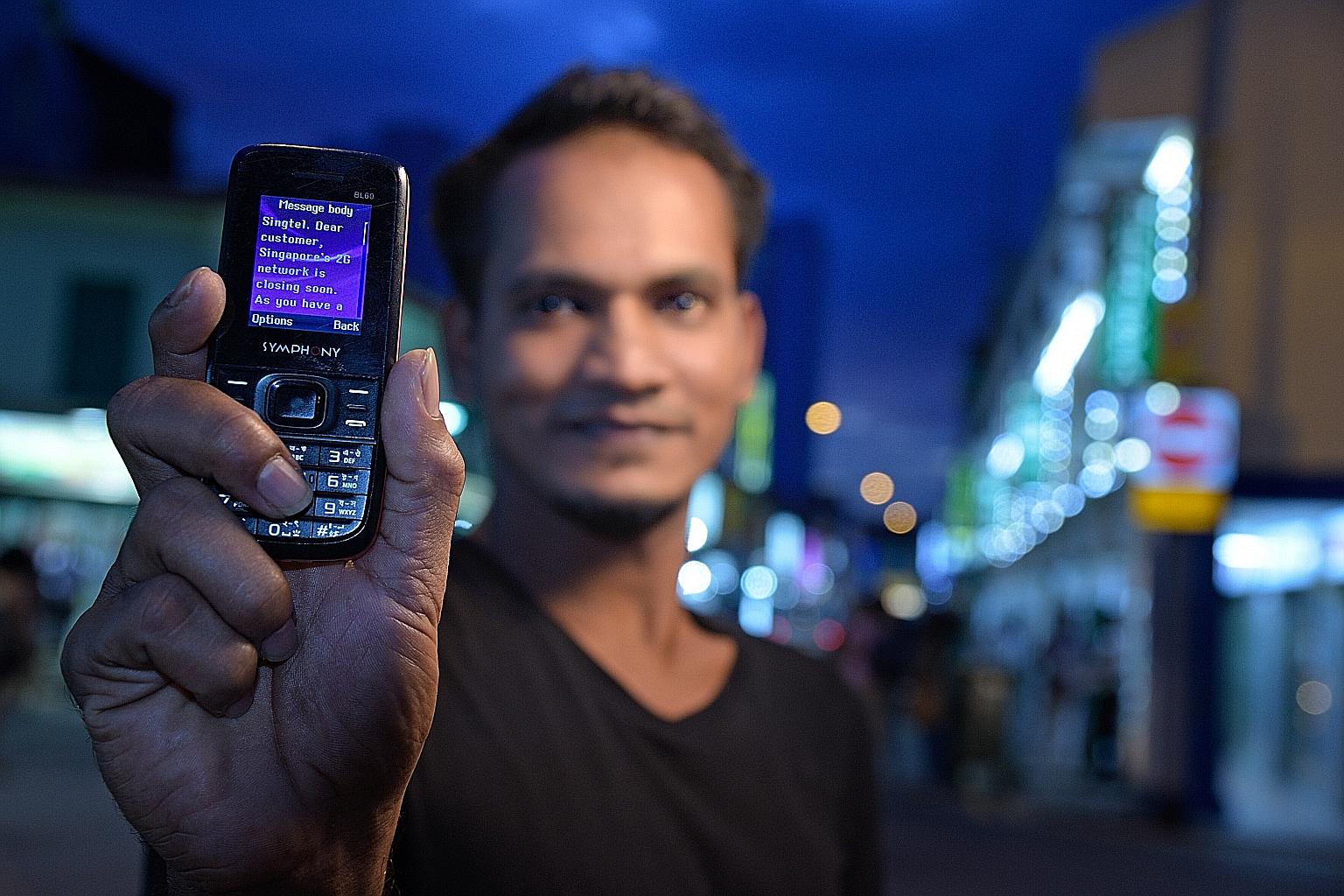Group helping foreign workers to get 3G phones
Sign up now: Get ST's newsletters delivered to your inbox

Mr Rajib, a shipyard worker who had a workplace injury last month and relies on TWC2 for help with meals, uses his 2G phone to keep in touch with his mother in Bangladesh. But these phones are slated to become obsolete here next April, when local telcos pull the plug on the 2G network. It was reported last year that 2G services were used by only 3 per cent of mobile users here.
ST PHOTO: DESMOND WEE
The humble 2G phone, which provides only basic Internet access on top of voice calls and SMS, is an entry-level phone used by many foreign workers here to keep in touch with their loved ones back home.
For those involved in workplace disputes, it is even more essential as they may need to call for help.
But these phones are slated to become obsolete here next April, when local telcos pull the plug on the 2G or second-generation network. It was reported last year that 2G services were used by only 3 per cent of mobile users here.
A foreign workers' advocacy group is now trying to help needy workers upgrade to the more advanced 3G phones.
Mr Alex Au, treasurer of Transient Workers Count Too (TWC2), said that 20 per cent to 25 per cent of around 2,000 migrant workers whom it helps each year probably do not have 3G phones. Even if they do, these phones could be very old.
TWC2 helps workers, including maids and construction workers, who face problems such as injury, illness, salary issues or deportation. Phones allow them to call for help. While those who are better off may buy a 3G phone when 2G services end, that might not be the case for those stranded without a job.
"Typically, a worker with a complaint over unpaid or short-paid salaries will need to stay about two to three months for case resolution," Mr Au said, adding that a worker with an injury often stays longer.
While most cases are closed within nine months, a small number can stretch beyond a year and up to two years.
For example, Mr Rajib, a shipyard worker who goes by one name, had a workplace injury last month and relies on TWC2 for help with meals. The 30-year-old uses his 2G phone to keep in touch with his mother in Bangladesh, who worries about his health. Not knowing when his case will be settled, he said: "I don't have money (for a new phone)."
TWC2 hopes to get at least 100 phones. "Hopefully, we will get enough donations to give every TWC2 client who needs a replacement phone one," said Mr Au.
The group is calling for donations of money or used 3G phones. The cash will be used to buy second- hand phones, which could cost around $50 each, or chargers.
Its campaign, which started on Sunday, is expected to run for six months. As of yesterday, the group had raised over $1,100 on crowdsourcing platform Giving.sg.
Mr Jevon Ng of the Humanitarian Organisation for Migration Economics said the end of 2G services could affect employed migrant workers as well. "(For) those earning close to $300 to $400, a 3G phone will be costly."
Other problems could also arise from the switch to 3G, he said, as some 3G phones could break more easily, have a shorter battery life and be at risk of theft as they are pricier.
A 29-year-old migrant worker, who wanted to be known only as Mr Sohag, bought a new HTC smartphone four months ago which he uses in his dormitory for video calls over Wi-Fi with his family in Bangladesh. He has not dared to take it to work for fear of theft and damage. The 2G Nokia phone he previously owned cost $10 to $20, but the HTC cost $320 - almost a month's pay.
Mr Russell Chua, 25, a content writer in an advertising agency, said he is considering donating his old phones. "If my old phones can help workers to keep in contact with their loved ones, I think it's quite meaningful."
•Find out how to drop off your phones here: twc2.org.sg/3G


